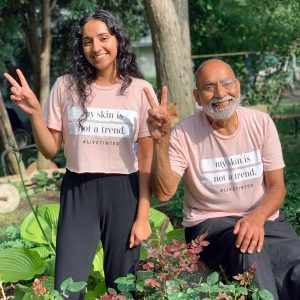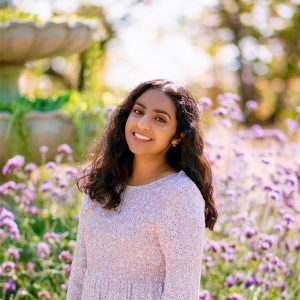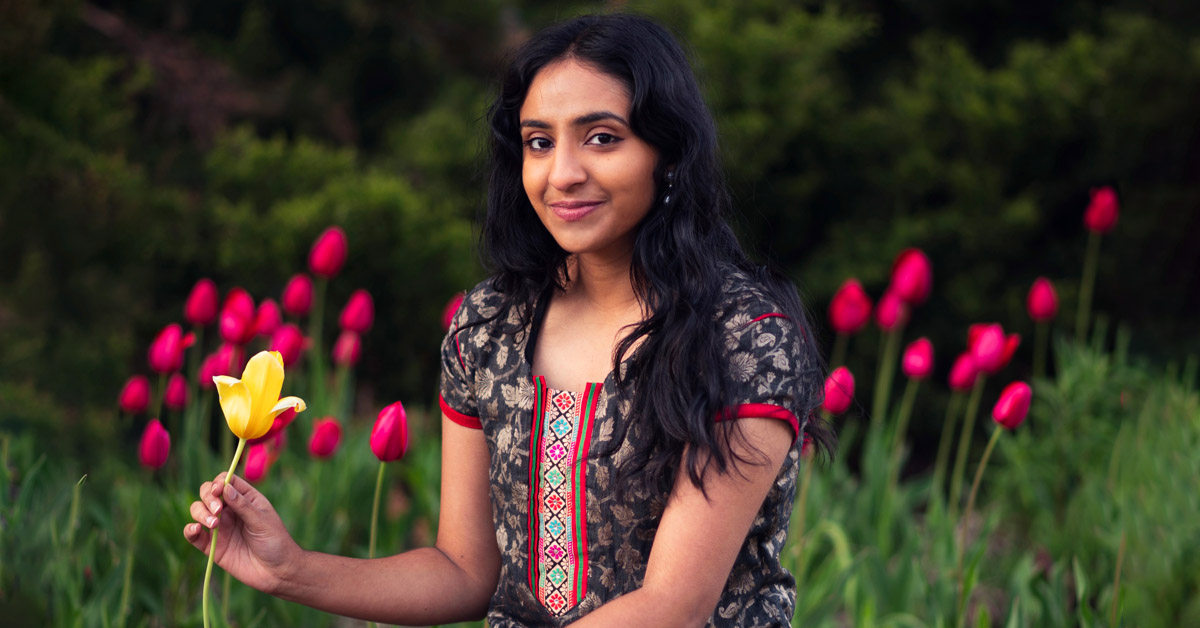Marali Singaraju is a second-year Community Health Promotion MPH student at the University of Minnesota School of Public Health. Marali’s public health education and experience is centered around creating vaccine equity across the globe. Learn more about Marali by reading her responses to the questions below.
Where did you grow up? Where did you attend undergrad and what was your area of study?
[Marali] I was born and raised in Minnesota but my parents immigrated from India so I also consider India as my home as well. When I was deciding where to go for college it was really important to me that wherever I went, I would get to meet people of different backgrounds. Ever since I was young, I’ve always had a very diverse group of friends and loved learning about their cultures and backgrounds. I think that helped stem my interest in doing global work. I did my undergrad here at the University of Minnesota, Twin Cities where I majored in Psychology and minored in Public Health and Sociology. When I started undergrad, my goal was to pursue global health and work for the World Health Organization (WHO) someday. With that goal in mind, I did a lot of advocacy work related to advancing human rights and health equity and was a part of our campus Model United Nations organization. Now reflecting back, it has been a really interesting journey with finishing undergrad, starting grad school, and doing public health work all during a pandemic.
What was the moment in your life when you decided you wanted to study public health?
[Marali] What got me interested in public health was global health. I’ve always wanted a career that would combine my passion for exploring the world since I love traveling and meeting people from diverse backgrounds along with my interests in health. I’ve always been interested in health, but not in medicine, which is because my mom raised me to view health in a more holistic light – which is much more than just what a doctor sees.

I also spoke with my Tati, my mom’s uncle, during my freshman year of high school about the public health work he had done in other countries, and I remember that really sparked my interest. So the more I explored the field of public health, I fell in love with the diverse opportunities I would have to make a unique impact across the world while advancing human rights and equity.
What public health issues do you care the most about and why? [Marali] I am passionate about so many issues in public health. I have always been interested in maternal and child health issues such as maternal and neonatal morbidity and mortality and reproductive health. I am also interested in addressing mental health disparities and increasing access to resources and integrating mental health into a holistic view of overall well-being and health.
Recently, I have been really passionate about One Health and Health Systems Leadership due to all of the pandemic work I have been a part of since 2020, and one particular issue that I have been mostly focusing on since last year is vaccine equity. I am currently an Americas Regional Leader with the International Working Group for Health Systems Strengthening (IWG) and am leading the Global Vaccine Equity Project to advance equitable distribution and access to COVID-19 vaccines. Vaccine equity goes beyond the sharing of vaccines, it is about respecting our healthcare workers, protecting children from child labor and child marriage, preventing exploitation of women, and improving mental health.
How would you like to help address or explore this issue?
[Marali] Our Global Vaccine Equity team at IWG has been incredible. Last year we developed a Youth-Led Demand for Global Vaccine Equity that emphasizes the impact of the pandemic on our youth and vulnerable populations and also proposes new strategies to achieve equity. We hope to get world leaders across health and politics to unite and collaborate and go beyond donations and promises to instead build long-term foundations to achieve equity. Our focus for this year is not only to amplify our current work but to also engage with various partners and stakeholders to promote action such as the WHO and create a people’s movement where leaders and everyday citizens are invested in vaccine equity together.
Are you currently involved in any public health research or professional work?
[Marali] I love maternal and child health, so I started working with the Mfangano Community Health Field Station in Kenya as a graduate research assistant. As an undergraduate, I used to work for the University’s Center for Global Health and Social Responsibility which is how I learned about this research and project collaboration. I’m currently a part of their MOMENTUM study research that examines the factors and barriers that impact access to care during maternal and neonatal emergencies on Mfangano Island, Kenya. We hope to use this research to gain more funding to increase resources and expand the current programs working to address the disparities.This has been one of the most rewarding and wholesome global health projects I have been a part of. I have enjoyed working with my team here in MN and Kenya along with various community leaders and health officials. I love that even though we can’t be together in person due to the pandemic, it’s still incredible to be working with my team virtually across the world who are amazing and talented people and bring so much hope and drive for change.
Why did you choose to come to the U of M School of Public Health (SPH)?
[Marali] I’ve always admired our public health programs because they’re highly ranked and well-rounded. In my first year of undergrad, I met with my public health minor instructor Sarah Sevcik who told me about her experience in the Community Health Promotion program here which got me interested. Although I was also interested in the Epidemiology program, I was drawn to the Community Health Program since I wanted to build skills in program development and evaluation which were unique to this program and beneficial for my specific career interests in global health.
What has been your favorite class so far?
[Marali] Community Health Theory and Practice II [PUBH 6051] and Evaluation 1 [PUBH 6034] which are both taught by Traci Toomey, have been my favorite classes so far. Learning how to create our own intervention from scratch and developing a grant proposal is a rewarding experience and builds incredibly valuable skills that are essential for public health.
In what ways is the school a good fit for you? 
[Marali] There are a lot of people who I’m close to within my program, and having a lot of people from diverse and different backgrounds has been comforting. The professors and students in the Community Health Promotion program are caring, open, and kind to the point where we are comfortable checking in during class to talk about our mental health. For me, I have a lot of COVID anxiety being involved in a lot of pandemic work, and my professors and peers have been supportive and flexible in response to my concerns. Overall, I feel as though I have a welcoming community here.
Are you familiar with the school’s Strategic Plan for Antiracism?
[Marali] Yes, and I have also seen some of the planning that has come out of the Center for Antiracism Research for Health Equity (CARHE).
What are you most excited about in the plan?
[Marali] I think it’s great that we’re investing in this work and I hope it doesn’t stop with the research and that it leads to meaningful and impactful action.
What is your vision for an antiracist school of public health?
[Marali] I think one of the main areas would be our education curriculum. A lot of people entering public health are aware of inequities and racism but don’t have the mindset and commitment to address it. Most of the time we just spend a lot of energy talking about inequities and issues but less about how to address them or take action which is something that everyone should learn. I’ve seen a lot of health equity work put onto the BIPOC community to be done but it would be better to include health equity as a foundational piece of our curriculum and in general in the way our school and public health work functions such that everyone is involved.
What do you like about being in Minnesota?
[Marali] I enjoy the diversity of the Twin Cities, we have so many communities locally and across the world from various backgrounds and histories and they contribute so much to the culture and growth of the Twin Cities. Most importantly, even with all of the police brutality and human rights events that have occurred in these past two years, and through all the heartbreak and pain, we have seen the strength of these communities rising together. The people here have shown me what it takes to make real change and the resiliency to move forward no matter what happens.

